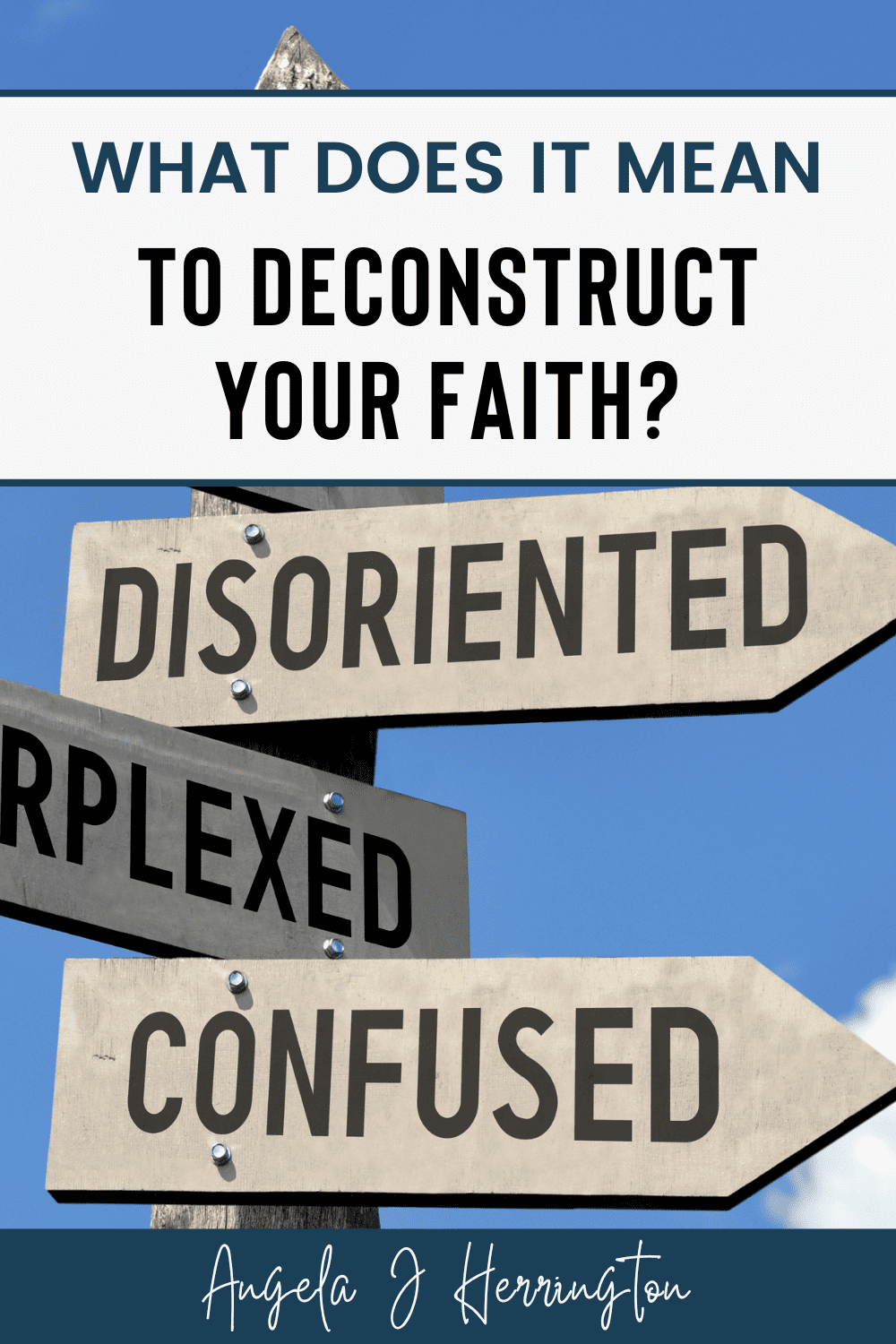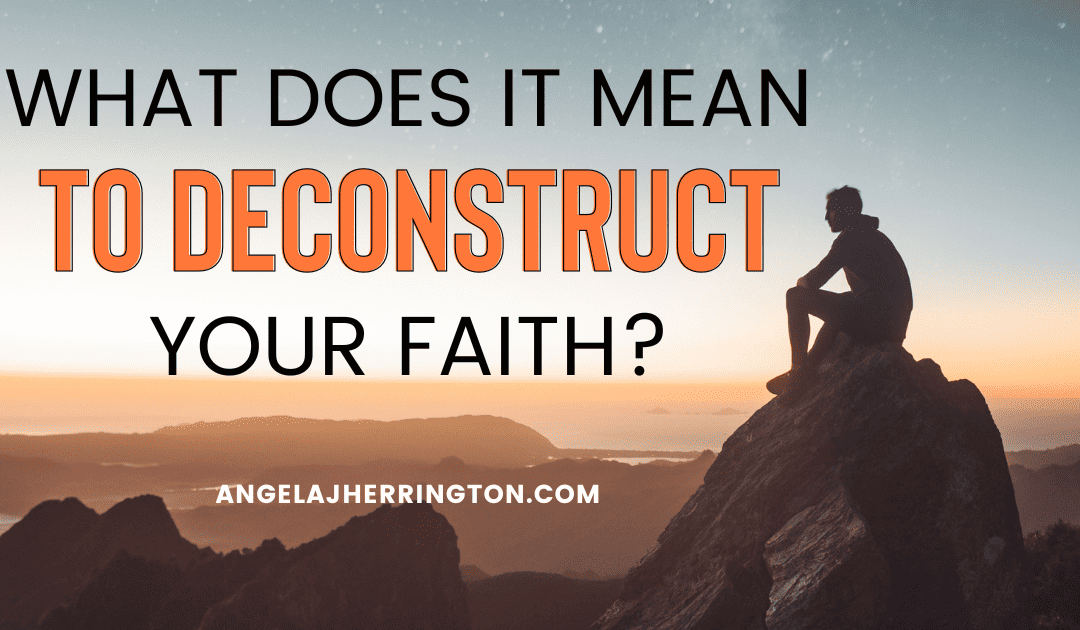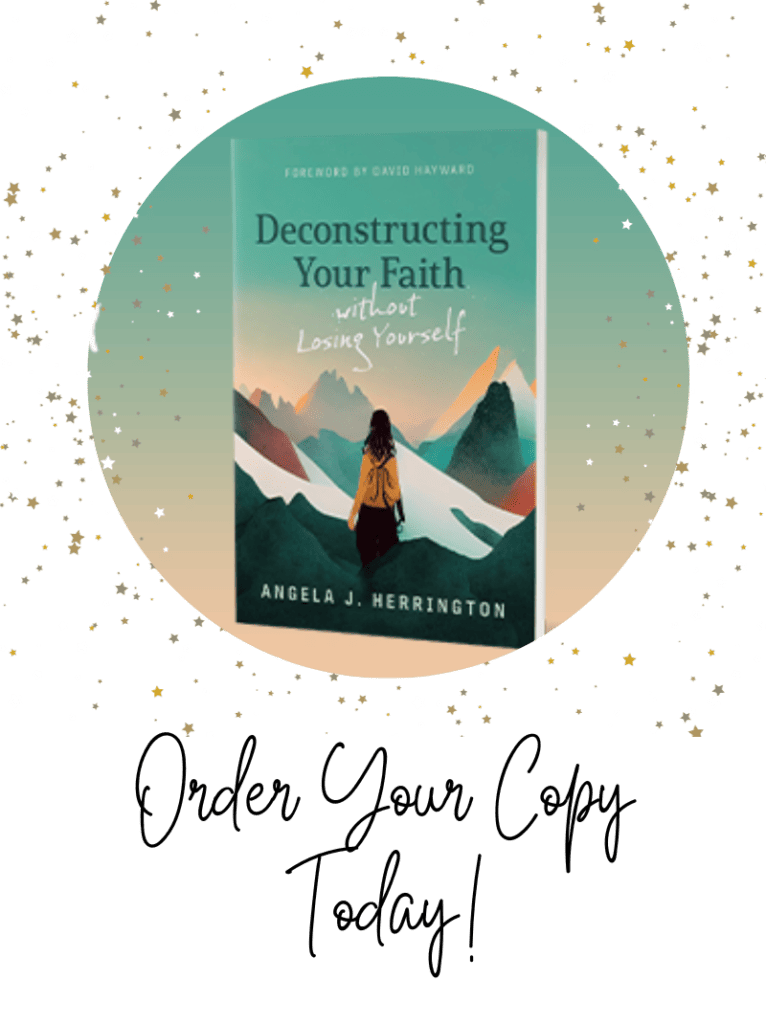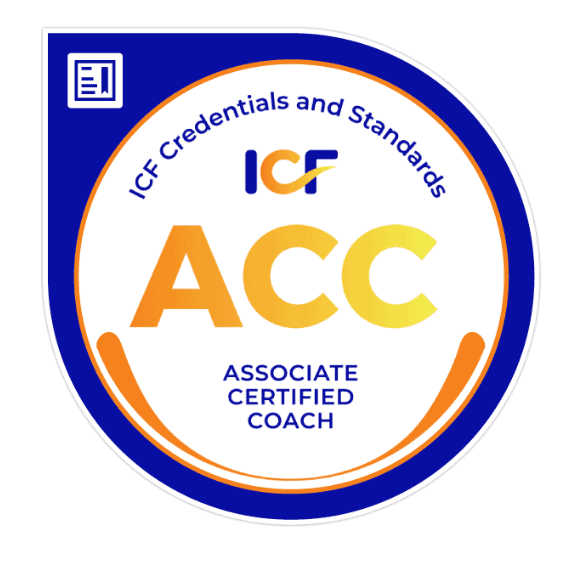Are you tired of playing by the rules of a rigid, dogmatic faith?
Are you ready to break free from the chains of religious tradition and embrace a more authentic, personal spirituality? If so, it could be time to deconstruct your faith. Deconstructing your faith means questioning the beliefs and practices you’ve been taught and dismantling the structures that have kept you boxed in. It means daring to explore new ideas, challenging the status quo, and reimagining what it means to be a person of faith.Remember: Deconstructing your faith is not the same as rejecting or abandoning one’s faith altogether. Instead, it is a process of deepening and refining one’s spiritual beliefs and practices.
But let’s be honest. Deconstructing your faith isn’t for the faint of heart. It’s a messy, often painful process that can leave you disoriented, lost, and angry. You may find that the things you once held dear no longer have the same meaning and struggle to find a sense of belonging in a world that no longer fits the mold of your previous beliefs. So why invest the energy it takes to deconstruct your faith? Deconstructing your faith allows you to let go of harmful or oppressive beliefs and practices and embrace a spirituality that aligns with your authentic self.Deconstructing Your Faith is about letting go of what no longer serves you and making room for what does.
When you deconstruct your faith, you create space to explore new ideas, find new communities, and discover a conviction based on love, compassion, and inclusion rather than fear, shame, and exclusion. So, how do you deconstruct? It starts with asking questions. It’s about stepping back and asking yourself, “Do I believe this? Why do I believe it? How does it align with my values and experiences?” Another aspect is redefining your spiritual practices. Asking yourself, “How do I hear God or Spirit?” as you explore new forms of prayer or meditation, you’ll re-evaluate the role of ritual in your spiritual life and find new ways to connect with the divine. As you ask these questions, you may come against challenging toxic beliefs and practices that may harm oneself or others. This process can include questioning patriarchal or exclusionary teachings, rejecting harmful methods like conversion therapy, and lead to you advocating for greater inclusivity and acceptance within one’s faith community.Take time to educate yourself, and don’t be afraid to seek out new sources of knowledge and inspiration as you deconstruct your faith.
Read books, listen to podcasts, and converse with people who have gone through the deconstruction process to help you gain new perspectives and insights while you deconstruct your faith. Read books and articles by authors who challenge your assumptions, and seek out communities open to exploring new ideas. Part of your exploration may also be exploring other spiritual traditions. Maybe you attend services or events of other religions, read spiritual texts from other traditions, or learn about the beliefs and practices of other faith communities.Deconstructing your faith is an ongoing process of discovery, questioning, and growth. It’s about recognizing that faith is not a static thing but a dynamic and evolving part of our lives.
If you are considering deconstructing your faith, many resources are available to help you.
Here are a few to get you started:- Books: Many books are available on how to deconstruct your faith (mine is available here!), but I’ve compiled a list of the books I recommend for you, sorted by theme, here.
- Podcasts: Many podcasts explore the topic of deconstructing faith, including interviews with experts, personal stories, and thoughtful discussions on the process of deconstruction. Here is a list of the favorites I trust.
- Online Communities: There are many online communities available for those who are deconstructing their faith. These communities offer a space for sharing experiences, asking questions, and finding support. I invite you to check out my free Facebook group, The Faith Deconstruction Cafe.
- Faith Deconstruction Coaching: Typically smaller and more private than free online deconstruction spaces, group coaching provides a perfect blend of community and support from a coach.
Remember, when you deconstruct your faith it’s not about throwing the baby out with the bathwater; it’s about breaking free from the chains of tradition and embracing a spirituality that is authentically yours.
There Are Also A Few Key Things To Avoid As You Deconstruct Your Faith
First off, don’t rush the process. Deconstructing your faith is not a race; it’s a journey, and it takes time. Give yourself permission to go at your own pace and be patient with yourself along the way. Secondly, try not to isolate yourself. It can be tempting to withdraw from community and support systems while you’re questioning your beliefs, but isolation can actually make the process harder. Seek out people who understand what you’re going through and can offer support and encouragement. Another thing to avoid is getting stuck in black-and-white thinking. Deconstructing your faith often involves grappling with complex and nuanced issues, and it’s okay if you don’t have all the answers right away. Embrace the gray areas and be open to exploring different perspectives. It’s also important not to dismiss your emotions. Deconstructing your faith can bring up a lot of feelings – anger, sadness, confusion, fear – and it’s essential to acknowledge and process these emotions rather than pushing them aside.Doubts and Concerns Are Normal, Here’s How To Handle Them
It’s normal to have doubts and concerns when contemplating faith deconstruction. Most people worry about losing a sense of identity, facing rejection from loved ones, or feeling adrift without the structure of your faith community. However, it’s essential to recognize that these doubts are a natural part of the process and can often lead to deeper self-understanding and growth.It’s natural to feel a strong attachment to the beliefs and practices that have shaped who you are.
However, deconstructing your faith doesn’t mean losing yourself; rather, it’s an opportunity to rediscover and redefine what spirituality means to you on a personal level. Another concern is the potential for rejection from loved ones or community members. It’s understandable to worry about how others will react to your changing beliefs, especially if you’ve been deeply ingrained in a religious community. While some may struggle to understand or accept your journey, it’s essential to surround yourself with supportive individuals who respect your autonomy and growth.Additionally, you may fear feeling adrift or lost without the structure and guidance of your faith community.
Your worries are 100% valid, but it’s important to remember that deconstruction is a process of exploration and discovery. As you question and challenge your beliefs, you’ll have the opportunity to connect with new communities, explore diverse perspectives, and cultivate a spirituality that resonates with your authentic self. And finally, don’t forget to take care of yourself as you deconstruct your faith. Deconstructing your faith can be emotionally draining, so make self-care a priority. Take breaks when you need them, engage in activities that bring you joy, and lean on your support system for help and encouragement. Remember, choosing to deconstruct your faith is a deeply personal journey, and there’s no one-size-fits-all approach. Trust yourself, be kind to yourself, and know that you’re not alone in this process.So go ahead, embrace the journey of curiosity, deconstruct your faith, and build a spiritual life you love.
Hungry for more articles to help you deconstruct your faith? Here are a few popular faith deconstruction related posts you’ll find helpful:
What Does it Mean to Deconstruct Your Faith? Sometimes You Have to Leave the Church to Find God Is Deconstructing Your Faith Biblical? 8 Reasons Why Christians Should be 2SLGBTQIA+ Allies Deconstructing While Parenting How to Get Out of Toxic Religion The Best Faith Deconstruction Conferences & Online Summits Deconstructing Your Faith When Your Partner Isn‘t The Best Books for Deconstructing Your FaithStill want to learn more?
Here’s a Facebook Live about what faith deconstruction is!




Angela is a Faith Deconstruction Coach and host of The Deconstructing Faith Summit who helps people break free from toxic religious culture & empowers them to recover from #churchhurt. She has led online ministries for a decade, enjoys working with clients 1:1, in groups, and is a dynamic conference speaker. She’s a Lark’s Song Certified Life Coach who reaches thousands of people in 40+ countries each month on Facebook, IG, Twitter, Pinterest, and her blog.
She’s a firstborn, Enneagram 8, Gen Xer who loves to question everything. She holds a BA from Indiana Wesleyan and a Masters in Leadership from Wesley Seminary. Her graduate research project focused on leadership development and opportunities for Gen X women in the US church.
Angela and her unique online ministry are featured in Lyz Lenz’s 2019 book God Land: Story of Faith, Loss, and Renewal in Middle America. She has published articles in Hope for Women and HOPE is Now magazines. She has been featured in The New Republic, Publisher’s Today, and Religion News Service.
Her first book, Deconstructing Your Faith Without Losing Yourself, Will be published by Eerdmans in February 2023.
Angela is also a wife, mom to 5, and a proud resident of Marion, Indiana with her family when they’re not traveling the US in their RV.





